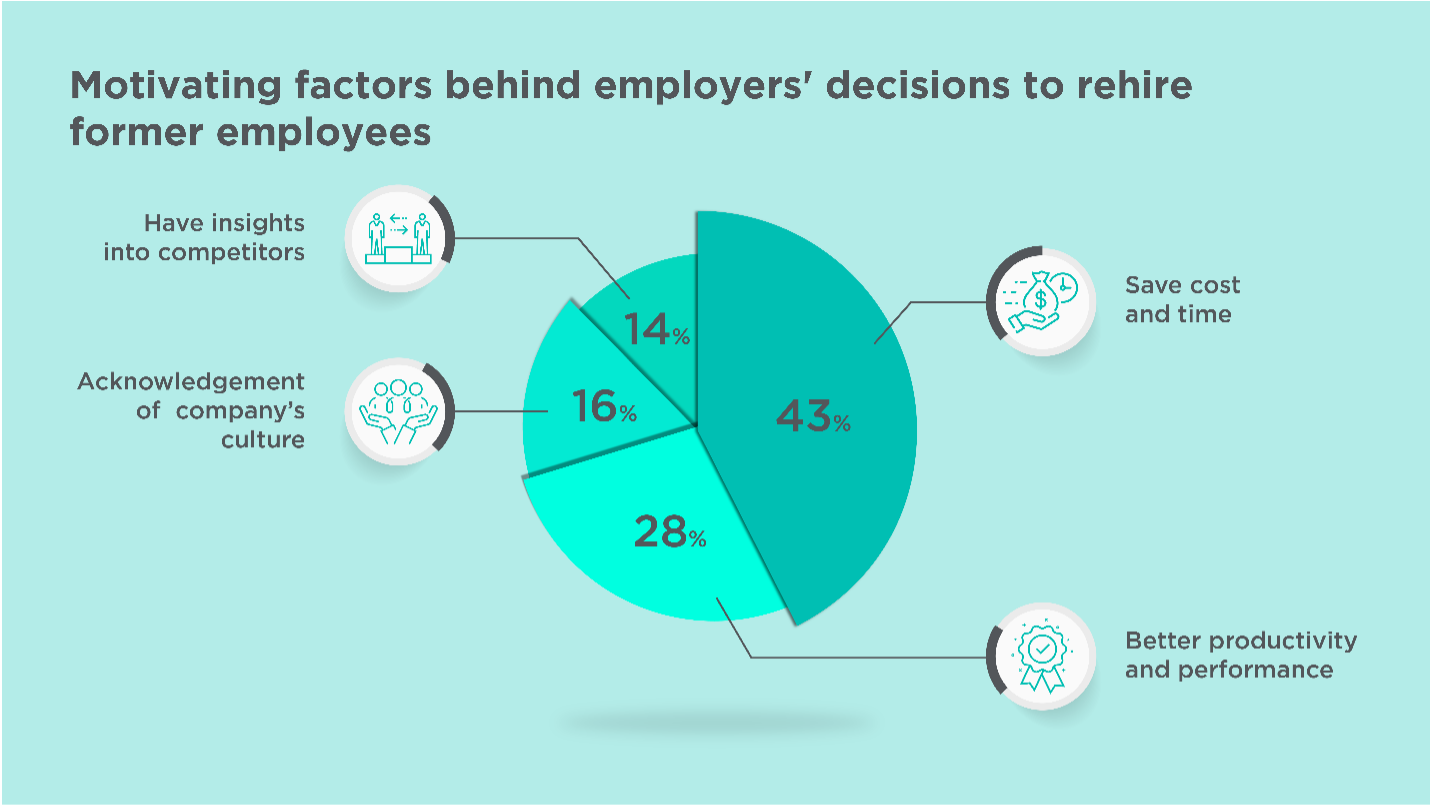「迴力鏢員工」應該回到原來的工作崗位嗎?

Authored by Thammaiah BN, Managing Director & Country Head, PERSOLKELLY India.
「 迴力鏢員工」 指稱那些離開一家公司但後來再次返回的人。 這一趨勢最近變得更加流行,主要是因為COVID-19大流行對勞動力造成了許多變化。
根據先前的數據,在疫情期間約有20%辭職的員工現在已經重新加入了他們以前的公司。這對公司來說是一個重要的機會,因為有很多公司希望重新雇用他們的舊員工,而這些舊員工與他們和平離開的前同事仍然保持聯繫。然而,對於試圖留住最近招募的員工的公司來說,這一現象可能構成挑戰。這些最近招募的員工可能希望離開並回到他們以前的工作,使雇主難以保留他們擁有技能的員工。
我們最近在LinkedIn上進行了一項調查,以進一步探討大多數雇主決定重新雇用「迴力鏢員工」背後的激勵因素
下面的圖表代表了調查結果 :
.png)
你應該成為其中之一嗎? - 利與弊
《哈佛商業評論》發現,有顯著的28%的「新員工」實際上是在過去三年內曾離開同一家公司的人。
這一數字引發了一個問題,即員工是否應該考慮成為其中之一。讓我們探討一下成為「回力鏢員工」的利與弊。
益處
即時技能應用
回到以前的公司意味著你擁有重要的公司知識和技能組合,可以立即應用。這對你和雇主都有益,因為通常在入職過程中需要進行廣泛的培訓期,而現在則無需如此。利用你對公司系統和流程的熟悉知識可以大大降低組織的成本和時間。
高效適應
作為一名回歸的員工,你回到公司後更容易融入和適應,因為你之前在公司的經驗。這不僅會加速過程,還會激勵你在不需要過多培訓的情況下提高產出和效率。此外,你對公司的環境和文化感激的了解有助於保持穩定,加強所有人共享的價值觀。因此,團隊更好地協同工作,從而實現公司的整體成功
強大的人脈網絡
重新加入你以前的雇主為你提供了一個獨特的機會,可以利用你在以前任職期間已經建立的專業人脈網絡。這個網絡在你的職業生涯的各個方面都可能非常有價值。
職涯成長機會
當你回到以前的公司時,如果公司重視你的技能和以前的表現,這將為你在職業生涯中取得更高晉升的機會提供強大的可能性。尤其是當你對相關行業有了更深入的了解,並從之前的工作中獲得了對競爭對手的洞察力時,這一機會更為顯著。他們可能會看到你的潛力,並給予你更重要的職位或有趣的項目,這對你來說可能會非常合適。
減少求職的不確定性
在經濟不穩定和激烈的就業市場競爭時,回到以前的公司可以為你提供一種令人安心的穩定感和安全感。這在「大規模辭職」趨勢下變得更加相關,許多人正在離開他們的工作。回到你已經非常熟悉的工作場所,了解其動態和文化,可以減輕轉行帶來的壓力。
弊端
停滯及成長侷限
重新加入以前的工作可以帶來一些立即的好處,比如熟悉和舒適感,但如果公司缺乏明確的縱向或橫向晉升途徑,這也可能帶來停滯的風險。如果沒有新的挑戰和機會,你可能會發現自己的職業增長受限,可能會阻礙你的職業發展和長期抱負。
剩餘議題
重返以前的雇主可能意味著面對曾讓你離開的相同問題。如果公司沒有解決管理、工作文化或其他問題等諸如此類的困難,你可能會再次感到不滿。這可能會影響你對工作的滿意度和投入程度。
同事的看法
當你回到公司時,你的同事可能會認為你不夠投入或擁有雄心壯志,因為他們可能會認為你沒有在其他地方有更好的選擇。 這種想法可能會改變你與同事相處的方式,影響你們作為團隊合作的方式,甚至可能阻止你獲得領導職位或額外的任務。
談判能力
當你重新加入以前的雇主時,你可能會面臨在談判就業條件方面的挑戰,包括薪酬和福利。公司可能會假設你渴望回歸將使你接受競爭性較差的提議,可能會使你在薪酬討論和談判中處於不利地位。
適應挑戰
儘管你之前在該公司有經驗,但在一段缺席期之後重返仍可能面臨適應性挑戰。工作場所可能發生了變化,例如新的團隊成員、更新的政策或公司結構的變動。要無縫融入工作環境,可能需要靈活性和開放心態,以成功應對這些變化。
最終,決定是否回到以前的工作取決於你的個人情況、你對職業的期望以及公司的具體提議細節。考慮利弊可以幫助你決定是否重返以前的工作場所是否符合你未來的職業目標。
作為一個迴力鏢員工,你應該或不應該做些什麼事情?
如果你正考慮成為一名迴力鏢員工,重新回到以前的公司,那麼以周到和戰略性的心態接受這個機會至關重要。 重新與以前的同事和老板建立聯繫,並利用這些聯繫進行合作和支持。確保對變化持開放態度,表現出對回歸的熱情。分享你在外部經驗中獲得的新想法,並始終表達你在公司內晉升的抱負,以追求職業成長。
不要纏繞於過去的問題,專注於在你目前的角色中產生積極影響。要很好地適應新的團隊動態,並遵循更新的公司政策。通過與新員工建立聯繫來擴展你的人脈網絡,促進歸屬感並創造成長機會。遵循這些指南將有助於你充分利用回頭客的經驗,實現在以前的組織中的職業目標。
結論
迴力鏢員工越來越普遍,顯示了職場的重大變化。雖然成為一名迴力鏢員工可以提供獨特的好處 :
・在做出決定之前,權衡潛在的缺點也是至關重要的。當你考慮回去或嘗試新事物時,要思考你的目標和公司的情況。
・要對變化和成長持開放態度,以確保充實的職業生涯。請記住,你的選擇應該與你的目標相符,並有助於你在工作中取得進步。
你的未來是否是成為一名迴力鏢員工?你是否對下一步仍然感到不確定?前往我們的徵才頁面,了解與PERSOLKELLY的嶄新的機會。
‘Boomerang employees’ is a phrase that refers to people who leave a company but later return to work there again. This trend has become more popular recently, primarily because of the COVID-19 pandemic which has caused numerous changes in the workforce.
Previous data reveals almost 20% of workers who resigned from their jobs during the pandemic have now re-joined their former employers This is a big opportunity for companies as a significant number of them want to rehire their old employees and are still connected with their ex-employees who had left on good terms. However, this phenomenon could pose a challenge for companies aiming to retain their recently hired staff. These recent hires might want to leave and go back to their old jobs, making it tough for employers to keep their skilled workers.
We have recently conducted a poll on LinkedIn to further explore the motivating factors behind most employers' decisions in rehiring a boomerang employee.
The chart below represents the results:

Should You Become One? – The Pros and Cons
The Harvard Business Review found that a notable 28% of 'new hires’ were actually people who had left their jobs at the same company in the last three years.
This number raises the question of whether employees should consider becoming one of them. Let’s explore the pros and cons of being a boomerang employee.
The Pros
Immediate Skill Application
Going back to a previous company means that you have the important company knowledge and skill set that can be used right away. This can be beneficial for both you and the employer, as there is no need for an extensive training period that is usually conducted during the onboarding process. Leveraging your acquired knowledge of the company's systems and processes can greatly cut down costs and time for the organisation.
Efficient Adaptation
As you come back to a company as a returning employee, the process of fitting in and adapting is easier following your previous experience with the company. This will not only speed up the process but also motivate you to channel enhanced output and efficiency without needing excessive training. Additionally, your acknowledgement of the company's environment and cultural gratitude helps keep things steady and strengthen the values everyone shares. As a result, the team works better together – leading to overall success for the company.
Strong Professional Network
Rejoining your former employer provides you with the unique opportunity to tap into the network of professional connections you have already established during your previous tenure. This network can prove to be valuable in various aspects of your career.
Career Growth Opportunities
When you return to a former employer, it gives you a strong chance to move up in your career – especially if the company values your skills and what you have done before. Even more so when you have a growing understanding of the related industry and insights into the competitors from your prior engagements. They might be able to see your potential and give you more important roles or interesting projects that can be a good fit for you.
Reduced Job Search Uncertainty
During times of economic uncertainty and strong job market competition, going back to a previous employer can provide a comforting sense of stability and security. This becomes even more relevant during the ‘great resignation’ trend, where many people are leaving their jobs. Returning to a workplace you already know well, with its dynamics and culture, can reduce the stress of changing careers.
The Cons
Stagnation and Growth Limitation
While rejoining a previous job can bring immediate benefits like familiarity and comfort, it may also pose the risk of stagnation if the company lacks clear pathways for vertical or horizontal advancement. Without new challenges and opportunities, you might find your career growth limited – potentially hindering your professional development and long-term aspirations.
Residual Issues
Returning to a former employer could mean facing the same problems that made you leave previously. If the company has not fixed issues like management, workplace culture, or other problems, you might feel unhappy again. This can affect how satisfied and engaged you are with your work.
Perception by Peers
When you come back, your coworkers might think you are not very committed or ambitious – as they might believe you did not have better choices somewhere else. This idea could change how you get along with your colleagues, work together as a team and even stop you from getting leadership roles or additional tasks.
Negotiation Power
When rejoining your former employer, you might face challenges in negotiating your terms of employment – including compensation and benefits. The company may assume that your eagerness to return will lead you to accept less competitive offers, potentially putting you at a disadvantage in salary discussions and negotiations.
Adjustment Challenges
Despite your previous experience with the company, returning after a period of absence can still present adjustment challenges. The workplace might have undergone changes, such as new team members, updated policies, or shifts in the company’s structure. Integrating seamlessly back into the work environment may require flexibility and open-mindedness to navigate these changes successfully.
Ultimately, deciding to go back to a previous job depends on your personal situation, what you want for your career and the details of the company's offer. Considering the pros and cons can help you decide if returning to your old workplace matches your future career goals.
What You Should or Shouldn’t Do as a Boomerang Employee
If you find yourself considering the prospect of becoming a boomerang employee and returning to your former employer, it's essential to approach this opportunity with a thoughtful and strategic mindset. Reconnect with your former colleagues and bosses, and use these connections for collaboration and support. Make sure to be open to changes and show enthusiasm for returning. Share your outside experiences for fresh ideas and always aim for career growth by expressing your ambition to advance within the company.
Don't dwell on past issues; focus on making a positive impact in your current role. Adapt well to new team dynamics and follow updated company policies. Expand your network by connecting with new employees to promote a sense of belonging and create growth opportunities. Following these guidelines will help you make the most of your boomerang experience and achieve your career goals in your former organisation.
Conclusion
Boomerang employees are on the rise, showing a big change in the professional world. Although being a boomerang employee can offer unique benefits:
-
It is also crucial to weigh the potential drawbacks before making a decision. As you contemplate going back or trying something new, think about your goals and the company's situation.
-
Be open to changes and growth to ensure a fulfilling career journey. Remember, your choice should match your goals and help you improve at work.
Is being a boomerang employee in your future? Are you still uncertain about your next step? Head over to our career page for a fresh and new opportunity with PERSOLKELLY.
